Related Research Articles
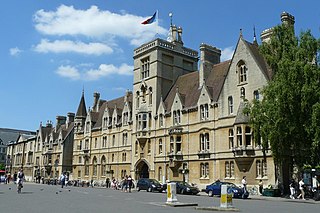
Balliol College is one of the constituent colleges of the University of Oxford in England. One of Oxford's oldest colleges, it was founded around 1263 by John I de Balliol, a landowner from Barnard Castle in County Durham, who provided the foundation and endowment for the college. When de Balliol died in 1268, his widow, Dervorguilla, a woman whose wealth far exceeded that of her husband, continued his work in setting up the college, providing a further endowment and writing the statutes. She is considered a co-founder of the college.

Kellogg College is a graduate-only constituent college of the University of Oxford in England. Founded in 1990 as Rewley House, Kellogg is the university's 36th college and the largest by number of students. It hosts research centres including the Institute of Population Ageing and the Centre for Creative Writing, and is closely identified with lifelong learning at Oxford.

The Oxford Internet Institute (OII) is a multi-disciplinary department of social and computer science dedicated to the study of information, communication, and technology, and is a part of the Social Sciences Division of the University of Oxford, England.

The Oxford Centre for Hindu Studies, founded in 1997, is a recognised independent centre of the University of Oxford, England. It develops academic programmes of education, research and publishing in Hindu studies. It aims to encourage the Hindu community in the academic study of their own traditions and cultures.
The Regius Professor of History at the University of Oxford is a long-established professorial position. Holders of the title have often been medieval historians. The first appointment was made in 1724. The term "Regius" reflects the origins of the post as a royal appointment, itself a recognition of the important influence of history.
Honorary titles in academia may be conferred on persons in recognition of contributions by a non-employee or by an employee beyond regular duties. This practice primarily exists in the UK and Germany, as well as in many of the universities and colleges of the United States, Australia, Hong Kong, Taiwan, China, New Zealand, Japan, Denmark, and Canada.
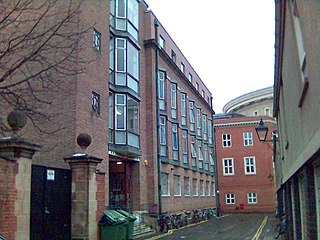
The Faculty of Asian and Middle Eastern Studies, is a subdivision of the University of Oxford.

The Mathematical Institute is the mathematics department at the University of Oxford in England. It is one of the nine departments of the university's Mathematical, Physical and Life Sciences Division. The institute includes both pure and applied mathematics and is one of the largest mathematics departments in the United Kingdom with about 200 academic staff. It was ranked as the top mathematics department in the UK in the 2021 Research Excellence Framework. Research at the Mathematical Institute covers all branches of mathematical sciences ranging from, for example, algebra, number theory, and geometry to the application of mathematics to a wide range of fields including industry, finance, networks, and the brain. It has more than 850 undergraduates and 550 doctoral or masters students. The institute inhabits a purpose-built building between Somerville College and Green Templeton College on Woodstock Road, next to the Faculty of Philosophy.
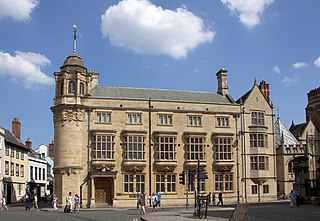
The Indian Institute was an institute within the University of Oxford. It was started by Sir Monier Monier-Williams in 1883 to provide training for the Indian Civil Service of the British Raj. The institute's building is located in central Oxford, England, at the north end of Catte Street, on the corner with Holywell Street, and facing down Broad Street from the east.
Richard Francis Gombrich is a British Indologist and scholar of Sanskrit, Pāli, and Buddhist studies. He was the Boden Professor of Sanskrit at the University of Oxford from 1976 to 2004. He is currently Founder-President of the Oxford Centre for Buddhist Studies. He is a past president of the Pali Text Society (1994–2002) and general editor emeritus of the Clay Sanskrit Library.

Lance Selwyn Cousins was a British scholar who specialised in the field of Buddhist Studies.

The Oxford Centre for Hebrew and Jewish Studies (OCHJS) is a recognised independent centre of the University of Oxford, England. Its research fellows teach on a variety of undergraduate and master's degrees in Oriental studies, and it publishes the Journal of Jewish Studies.
The Faculty of Philosophy, University of Oxford was founded in 2001. It is part of Oxford's Humanities Division. The faculty is located next to Somerville College on Woodstock Road. As of 2020, it is ranked 1st in the UK and 2nd in the English-speaking world by the Philosophical Gourmet Report, as well as 2nd in the world by the QS World University Rankings. It is additionally ranked first in the UK by the Complete University Guide, the Guardian, the Times, and the Independent.

The position of Laudian Professor of Arabic, now known as the Abdulaziz Saud AlBabtain Laudian Professor, at the University of Oxford was established in 1636 by William Laud, who at the time was Chancellor of the University of Oxford and Archbishop of Canterbury. The first professor was Edward Pococke, who was working as a chaplain in Aleppo in what is now Syria when Laud asked him to return to Oxford to take up the position. Laud's regulations for the professorship required lectures on Arabic grammar and literature to be delivered weekly during university vacations and Lent. He also provided that the professor's lectures were to be attended by all medical students and Bachelors of Arts at the university, although this seems not to have happened since Pococke had few students, despite the provision for non-attenders to be fined. In 1881, a university statute repealed Laud's regulations and provided that the professor was to lecture in "the Arabic, Syriac, and Chaldee Languages", and attached the professorship to a fellowship at St John's College.
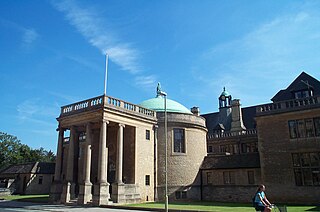
Rhodes House is a building part of the University of Oxford in England. It is located on South Parks Road in central Oxford, and was built in memory of Cecil Rhodes, an alumnus of the university and a major benefactor. It is listed Grade II* on the National Heritage List for England.
The Faculty of Medieval and Modern Languages is a department of the University of Oxford, England. It is part of the university's Humanities Division.
The Faculty of History at the University of Oxford organises that institution's teaching and research in medieval and modern history. Medieval and modern history has been taught at Oxford for longer than at virtually any other university, and the first Regius Professor of Modern History was appointed in 1724. The Faculty is part of the Humanities Division, and has been based at the former City of Oxford High School for Boys on George Street, Oxford since the summer of 2007, while the department's library relocated from the former Indian Institute on Catte Street to the Bodleian Library's Radcliffe Camera in August 2012.
A recognised independent centre (RIC) of Oxford University was a status awarded to acknowledge a special relationship with a small number of institutes and centres which are involved in teaching and research in their specialised areas in Oxford.
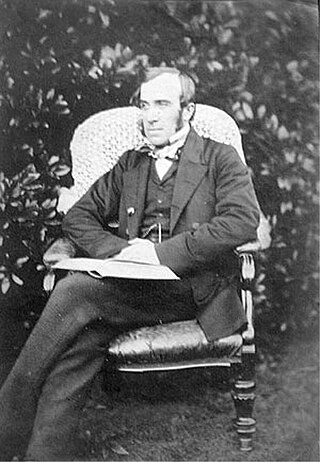
The position of Boden Professor of Sanskrit at the University of Oxford was established in 1832 with money bequeathed to the university by Lieutenant Colonel Joseph Boden, a retired soldier in the service of the East India Company. He wished the university to establish a Sanskrit professorship to assist in the conversion of the people of British India to Christianity, and his bequest was also used to fund scholarships in Sanskrit at Oxford. The first two professors were elected by Oxford graduates, as the university's statutes provided: Horace Hayman Wilson won by a narrow majority in 1832, and the 1860 election was hotly contested, as the rivals each claimed to be best at fulfilling Boden's intentions and presented different views about the nature and purpose of Sanskrit scholarship. Reforms of Oxford implemented in 1882 removed all mention of Boden's original purpose from the statutes, removed the power to elect the professor from graduates, and gave the holder of the professorship a fellowship at Balliol College, Oxford.
The various academic faculties, departments, and institutes of the University of Oxford are organised into four divisions, each with its own Head and elected board. They are the Humanities Division; the Social Sciences Division; the Mathematical, Physical and Life Sciences Division; and the Medical Sciences Division.
References
- ↑ "First endowed Professorship in Buddhist Studies in the UK is established at Oxford - University of Oxford". Ox.ac.uk. Retrieved 9 October 2012.
- ↑ "Buddhist Studies at Oxford - South and Inner Asia - Faculty of Oriental Studies - University of Oxford". Orinst.ox.ac.uk. 2 November 2011. Archived from the original on 19 October 2012. Retrieved 9 October 2012.
- ↑ Archived July 23, 2011, at the Wayback Machine
- ↑ "Oxford University Gazette, 30 April 2009: Lectures". Ox.ac.uk. Retrieved 9 October 2012.
- ↑ "Professorship of Buddhist Studies". Balliol.ox.ac.uk. Balliol College. 15 March 2010. Retrieved 9 October 2012.
- ↑ "Equinox - Books - Browse by Series". Equinoxpub.com. Retrieved 9 October 2012.
